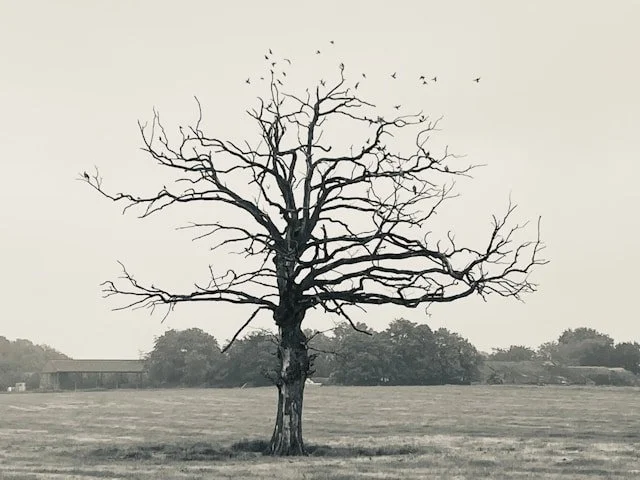Is ‘Be True to Yourself’ Good Advice? Brian Rosner begins, “You don’t need to look far today to notice that personal identity is a do-it-yourself project. A gym near where I live advertises itself with the slogan: “Be Fit. Be Well. Be You.” A new apartment complex around the corner, offering high-end luxury design, carries the byline: “An Unlimited You.” People think about themselves constantly, it seems, and with high expectations!”
The Dead Seriousness of Careless Words: Tim Challies concludes, “And as it is right and just that there be an accounting for the careless performance of tasks, it is right and just that there be an accounting for the careless uttering of words. For words can bring harm every bit as much as deeds.”
The Internet is More Powerful Than the Printing Press: Chris Martin makes the argument. “The internet is the most consequential technological advancement in human history.1 The most common retort to this hot take of mine is, "Yeah but the printing press.”
Reflections on Temptation from Peter’s Sifting: Wendy Willard shares, “God intends for us to be joined with Jesus so perfectly that we cannot be sifted out—or strained—regardless of how hard Satan shakes—or boils—us. Those negative statements we hear in our head? What if that’s Satan “sifting” us, trying to see if he can separate us from our Savior?”
The Land is Bright: Jake Meador celebrates the overturning of Roe. “Overthrowing Roe is not the totality of what our response to abortion ought to be, nor does it mean that the culture of death has been defeated (or the culture of life established), nor does it mean that our work to promote a culture of life is done. It simply means that one highly significant step in the quest to create a culture of life has been taken. But more must follow.”
FAQs: Supreme Court Overturns Roe, Sends Abortion Back to States: Joe Carter explains, “This is one of the most significant acts of justice in modern history. While ruling brings only a change of direction, not an end, to the fight over abortion, it is an essential victory for the pro-life cause that should be celebrated by all Christians. Roe was one of the most evil and repugnant decisions of jurisprudence in our nation’s history, on par with Dred Scott v. Sanford (1857) and Plessy v. Ferguson (1896).
This Week's Recommendations
A Church of Suspicious Minds: Trevin Wax’s post on the devastating impact on the seeds of suspicion is important. He says, “Once suspicion pervades a society, the slightest disagreements—even among people who generally share the same beliefs—get interpreted as signs of betrayal. Seeds of doubt are sown into every interaction, and often it’s the people closest to you who become the subject of your suspicions.”
Hope Has to Be Learned: I love this post from TM Suffield. He begins, “Hope is not an emotion, as though we summon it up and have a bright day looking at the future. We can certainly feel hopeful, but that is not the hope the Bible is talking about.”
7 Practical Ways to Counter the Wave of Deconstruction: There are a lot of wisdom in Carey Nieuwhof’s post on how leaders (and everyone else, I would add) can speak to those deconstructing their faith. For instance, “Be forewarned: Being more open to people’s doubts and questions may lead you into unfamiliar territory. And that’s okay. You may need to become more comfortable with saying, ‘I don’t know’ or ‘That’s a great question I’ve never considered.’ But never view humility or empathy as a weakness—it’s an undeniable strength.”
Shame is a Cruel Taskmaster: Brianna Lambert reflects on her relationship with her body. She says, “I realized the years of shame I inflicted hadn’t done anything but crush me. Shame may have felt like a good idea at the time to get my body in line, but its roots were too weak to sustain any real fruit in my life.”
Is ‘Woke Church’ a Stepping Stone to Theological Compromise: The second in The Gospel Coalition’s series of debates, both Sean DeMars and Rebecca McLaughlin make important points.
This Week's Recommendations
Jesus Versus the Trade-In Society: Samuel James begins his excellent article, “It seems to me that if there’s one thing that our current version of advertising-based capitalism teaches us all, it’s that everything is replaceable: everything can be reproduced, or traded in for a new and improved model. And that applies to coaches, to churches, to spouses. We live in a trade-in society.”
9 Myths About Abortion Rights and Roe v. Wade: Kevin DeYoung considers some misconceptions. For instance, “Myth #6: Our abortion laws are mainstream compared with the rest of the world. Truth: The United States is one of only 10 nations that allow abortion after 14 weeks of gestation. Only four countries allow abortion for any reason after viability: Canada, North Korea, China, and the United States
The Ukelele and the Cross: J.A. Medders says, “Theologians have wrestled with the various angles that describe what Jesus did for us on the cross. Some will even argue that there is only one way to describe and define what Jesus did for us on the cross. Rather than pick sides on the theological playground, I want to propose a harmony of notes that are played at the cross of Christ.”
How Not to Pray with a Hurting Loved One: Blake Glosson’s post is helpful to all of us. He says, “There’s certainly a time to give advice, but prayer isn’t the place for it. Prayer is not a free pass to share your opinions with the other person while pretending to talk to God (this is manipulative and the other person will feel it).”
Constructing the Roman Road: A short video on what became a significant cause for the spread of the gospel.
Need a Book for the Pool?
This Week's Recommendations
What Convinced James His Brother Was God? Robby Lashua begins, “My brother isn’t God. It’s pretty obvious (we grew up together, after all), and nothing he could do or say could convince me of his divinity. I’m not God, either, and nothing I could do or say would convince him otherwise, too. Yet, somehow, Jesus convinced his brother he was God.”
How Do I Know I’m Really Repentant? Jared Wilson takes on this important question. He begins, “What does a repentant heart look like? Does it just look sad? Timid? Is it simply agreeable? How would we discern the difference in ourselves between a heart turning from sin and one seeking simply to manage or alleviate the consequences of it?”
Still: Chris Thomas contrasts the difference between finding stillness in our surroundings between finding stillness in our hearts. He says, “I mention that because I’ve seen it in my own children. I’ve heard their cries in the night, rushed to their room to comfort them, only to be fought off with flailing arms; their saviour isn’t seen, only the shadows and monsters of the night fill their vision. First with gentle voice, but then with firm command that carries the edge of comfort, I subdue their fight with hands that hold them tight, and a voice that is meant to remind them of my strength.”
Americans Most Likely to Find Identity in Family and Accomplishments: Aaron Earls reports on findings. “When asked the open-ended question, “When you think about who you are, what are the first three things that come to mind?”…More Americans mention being a parent (25%), intelligent (12%), their job (11%), compassionate (11%), husband (10%), kind (10%), trustworthy (10%), wife (8%), friend (8%), hardworking (8%) and honest (8%).”
Sin is “Barbs in Your Eyes, Thorns in Your Sides”: Ryan Hawkins invites us to consider, “First, sin isn’t just wrong, but hurtful. This is basic, but understanding this is profound step in our walk with God. For if we think God wants us to love him and love others and avoid sin (all of which are what “holiness” is all about) just because it’s what we “should” do, our understanding is woefully incomplete and our motivation won’t be there. Rather, whatever is according to God’s ways is also always for our good. Conversely, what isn’t according to God’s ways will lead to our harm.”
Does Systemic Sin Exist?
Our world is talking theology. They probably aren’t aware of it, but theological conversations permeate the air. One such conversation that has persisted over the past several years has been about whether or not America is a racist nation. How would you answer that question: is America a racist nation?
I’m aware that the question itself likely creates a strong emotional reaction in you. But, if we can lean in together to listen to scripture, there is much we can learn from the question. Before we can answer the question, “Is America a racist nation,” we have to ask an underlying question: does systemic sin exist?
Johnny Depp and a Few Degrees Off Course
Who wouldn’t want to be Johnny Depp?
And yet, all it takes is a quick scroll through the news to see that this man’s life inspires more pity than envy. Johnny Depp’s ex-wife, Amber Heard has accused Depp of domestic abuse. Depp has fought back with a lawsuit charging Heard with abuse. Whatever the truth of who initiated the violence, one can’t help but be sad for Heard and Depp. Physical endangerment, drug and alcohol abuse, and violent, vulgar words marked their toxic and tumultuous relationship.
It has also been reported that Depp managed to blow through $650 million of his $800+ million net worth. One can’t help but scratch your head and wonder how spending that kind of money in a decade is even possible. One gets the sense that Depp has become the living version of his big screen caricature: intoxicated and unmoored.
Who would want to be Johnny Depp?
I think of my daughter and her friends in the final months of their senior year. These are days where they are peppered with questions about their future, “What are your plans?” “Where are you going?” “What are you going to do next?”
Setting one’s sights even slightly off course can result in significant error down the path. Air navigation experts refer to the one in sixty rule, which means that for every degree a plane veers off course initially it will miss its target destination by one mile for every sixty miles flown. The results can be fatal.
Sex, Sexuality, and Your Identity in Christ
A week and a half ago, my wife Angel and I had the opportunity to share with our Student Ministries about sex and sexuality.
Here is the outline of our talk:
Why is sex complicated?
What our sexuality has to do with trusting God.
What do we say to “Love is love”?
Why our identity is found in our sainthood, not our sexuality.
How our sexuality is for our joy and our discipleship.
Q&A
This Week's Recommendations
Humility is the Main Ingredient in Prayer, Thanksgiving, and Repentance: This post by Thomas Schreiner is so simple but so profound! I need to read this regularly. He says, “One of the most humble prayers in the world is “Help me, Lord.” We remember the simple prayer of the Canaanite woman when everything seemed to be against her. She cried out to Jesus, “Help me” (Matt. 15:25). Prayer is humble because when we pray, we are saying that God is merciful and mighty, that He is wise and sovereign, and that He knows far better than we do what is best for us.”
7 Encouraging Trends of Global Christianity: Aaron Earls reports good news emerging primarily from the global south. He shares, “Not only is religion growing overall, but Christianity specifically is growing. With a 1.17% growth rate, almost 2.56 billion people will identify as a Christian by the middle of 2022. By 2050, that number is expected to top 3.33 billion.”
6 Concerning Trends in Global Christianity: Aaron Earls shares the other side of the coin. He concludes, “At the turn of the 20th century, fewer than 900 million people were unevangelized. Today, that number is more than 2.2 billion who’ve never been told of Jesus. By 2050, the Gordon-Conwell report estimates the global unevangelized population will top 2.75 billion.”
The False Philosophy of Cancel Culture: Jonathan Hoyes explains why cancel culture reduces human relationships to a power struggle, “Put simply, cancel culture is a culture of bullying. What starts with a difference of ideas ends with a willful public destruction of other human beings. Those who claimed to be the ones bullied have now become the bullies themselves, all because of a shift of power.”
What’s the Tallest Thing We Could Possibly Build? Something a lot taller than I would have possibly imagined.
How My Backpack Points Me to God
I recently switched to my fourth bag in six years of pastoral ministry at New Life. I bought a leather briefcase that was too small and came apart at the seams followed by a leather briefcase that was too large and stiff. I gave up on the briefcase experiment and for the past three years I have used my son’s hand-me-down backpack from his middle school years. My wife and kids constantly teased me about my middle school backpack. But you know,
Fast forward to a couple of months ago. I was tagging along on a shopping trip and found a backpack tucked away on a clearance rack. It was love at first sight, and not just because of the 60% off tag. Made of canvas and leather it felt durable and yet malleable in my hands.
I picked up the bag and noticed detail after detail in the craftsmanship. A perfectly sized and padded pocket for my laptop, hidden interior pockets, comfortable straps, a high-quality zipper with a durable pull, magnetic latches, and two side pockets that cried out, “Put your coffee Contigo in me!”
There is something compelling about a well-made item.














